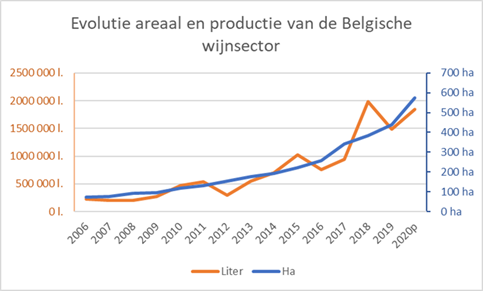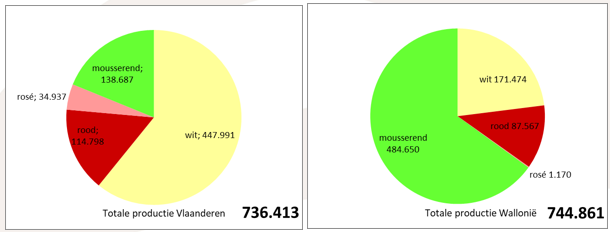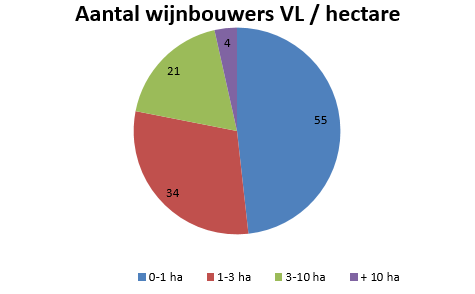Press release Great interest in the first Flemish wine symposium
The very first Flemish wine symposium brought together no less than 350 wine growers, agricultural and wine researchers, wine connoisseurs and policy makers for a digital symposium. The symposium is an initiative of Flemish Minister of Agriculture and Food Hilde Crevits, together with several partners. Minister Hilde Crevits puts her shoulders under the professionalization of this sector. Flemish winegrowers seem to have the wind in their sails: the sector is showing strong growth, they have a remarkable diversity and there is a clear ambition present. In almost 10 years, wine production has increased sixfold.
Vlaams wijnsymposium
Watch (in Dutch) the entire wine symposium: Eerste Vlaamse wijnsymposium - Deel 1 - YouTube.
Hilde Crevits: "Viticulture in Flanders is growing and flourishing. We already have 114 wine growers in Flanders. The time is ripe for professionalization. The wine sector and the research world are joining forces for this. Today they meet for the first time at the Flemish Digital Wine Symposium and this is the start of a fine wine tradition. VLAM is also ready to promote our wines."
The research world is gearing up for the wine sector: sustainable vineyard management, analytical techniques, control of plant diseases, controlled steering in vinification, even locally-better adapted grape varieties are research topics that are (going to be) on track in collaborations. ILVO and pcfruit are taking the lead here.
Minister puts her shoulders under further professionalization
The Flemish knowledge centers are tasked with helping to build a veritable local wine tradition. The symposium brings out what Flanders has to offer in terms of expertise and innovation. At the same time it is also an opportunity to clearly identify the needs of the sector.
Flemish Minister of Agriculture & Food Hilde Crevits: "I call on the researchers to work closely together, with each other but also with their foreign colleagues, so that Flanders can build on the expertise that is already available abroad."
Wine growers are also encouraged to get organized as an sector, to conduct joint promotional campaigns, to develop better labels and to focus on innovation. A project subsidy of EUR 60,000 has been made available for this purpose. It is the vzw Belgische Wijnbouwers, which unites the majority of Belgian winegrowers, that will get to work using those funds.
Chairman Boudewijn Waes: "Up until now we have worked purely on a voluntary basis. Soon as an interest group we will be recruiting someone who will help us draw a strategic line, in which recognizability, promotion and a professional self-organization will be important elements."
Strong growth: 6x more wine in 10 years
Minister Crevits: "In 2012, there was a total production of just under 300,000 liters of Belgian wine. Ten years later, this is more than 6 times as much, namely 1,850,000 liters. The area of vineyards has almost quadrupled in 10 years: in 2012 Belgium had 153 hectares of vineyards, in 2020 there will be 575."
Flanders and Wallonia are almost equal in production volume. In 2019, Flemish wine growers produced 736,413 liters of wine, compared to 744,861 liters of wine in Wallonia. On average, Walloon wine growers are larger than Flemish: In 2019, 114 Flemish wine growers were counted, compared to 40 in Wallonia.
A Flemish vineyard is, in the vast majority of cases, small in terms of acreage. More than half of the wine growers operate with a vineyard of less than 1 hectare. One third have 1 to 3 hectares. Only a quarter of the wine growers cultivate more than 3 hectares, of which 4 companies have established more than 10 hectares of vines.
ILVO agricultural economist Edward Belderbos: "The chance of creating good added value with viticulture is increasing. Several factors play a role in this: wine growers processes their own harvested grapes into a finished product. They can determine their own sales channels. The story, the local aspect and the experience around wine are an extra asset in the price setting and the image of Flemish wine is steadily improving."
Surfing on the trend of 'Cool Climate Wine'
So-called cool climate wines are a trend in wine country. Cool climate wines are generally lighter in body, with less alcohol, and higher, more mouth-watering acidity than their counterparts from warmer growing regions.
Vicky Everaert, unologist at pcfruit: "Our region is becoming increasingly favorable for these cool climate wines. Our grapes ripen in conditions with fewer hours of full sun and are therefore often lower in sugars. With climate change, we are getting more and more varieties that ripen better, yet retain more acidity than their counterparts from warmer growing areas. These differences and vagaries of nature present not only an opportunity but also challenges for cultivation.
Fundamental as well as practical knowledge from soil to (wine) glass
Both starters and professional wine growers need practical knowledge and support.
Marc De Loose, one of the scientific directors at ILVO: "Making wine is a long-term complex process that requires a wide range of expertise: it starts with the cultivation of grapes and ends with the vinification process and the marketing. There is a need for information, knowledge and support about this entire winemaking process. At the first Flemish wine symposium we try to respond to this by hearing experts from these different angles. The ambition is to bring viticulture and the relevant research areas even more in contact with each other with the aim of realizing a more efficient sharing of knowledge and initiating demand driven research that leads to implementation of innovations in viticulture practice."
Training courses are organized in Flanders for starting winemakers. The various associations often organize them. Also pcfruit guides wine growers during cultivation, and regularly organizes workshops and seminars.
Unification of research and policy for acceleration starting in 2021
Ten years ago, the Flemish policy focused on viticulture for the first time. At the first Round Table on Viticulture (initiative of Minister Peeters in Feb. 2012), the Working Group on Grape Growing was established, and the first steps were taken towards knowledge acquisition and training on the cultivation, (European) approvals, and implementation of EU legislation for organic wine.
Joris Relaes, Executive Director of ILVO: "At the time, there were 60 pioneering producers who were working on their own. Now the new but more mature wine sector is looking forward more as a collective. The researchers of various Flemish knowledge centers are going to work together on their ambition to continue to make even more quality wines in an innovative and sustainable manner."
Dany Bylemans, Proefcentrum Fruitteelt vzw: "A few years ago, with the increase in wine growing in Flanders, pcfruit was asked to support the wine growers in their technical cultivation challenges. However, there are many other aspects that the sector has to deal with. By exchanging knowledge and expertise between the various practice centers in Flanders, Belgium, but also in Europe, we can meet the various needs of the sector. The feedback from growers is therefore very important to be able to set up projects together with them."
Dirk-Antoon Samyn, President WOW-Winegrowers East-West vzw: "Working together, sharing knowledge and experience, even about our mistakes, that is what we want to encourage among colleagues. It is essential for all of us to build a good to excellent quality, and therefore a strong image, and to gain the trust of the consumer."




Contact
- Katrien Rosseel, spokesperson for Minister Crevits M. +32 475 44 58 32
- Greet Riebbels, ILVO Communications M. +32 486 26 00 14
- Dany Bylemans pcfruit:, dany.bylemans@pcfruit.be
- Timo Delvaux, Flanders Department of Agriculture and Fisheries: +32 2 552 79 55
- Lodewijk Waes, Belgische Wijnbouwers vzw: +32 475 20 45 70
- Dirk-Antoon Samyn, Wijnbouwers Oost-West vzw: +32 475 528 538